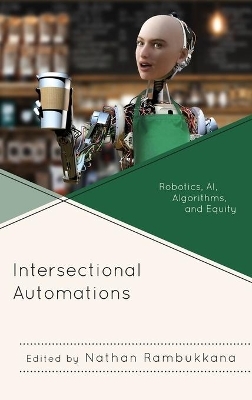
Intersectional Automations
Lexington Books (Verlag)
978-1-7936-2051-4 (ISBN)
Intersectional Automations explores a range of situations where robotics, biotechnological enhancement, artificial intelligence (AI), and algorithmic culture collide with intersectional social justice issues such as race, class, gender, sexuality, ability, and citizenship. As robots, machine learning applications, and human augmentics are artifacts of human culture, they sometimes carry stereotypes, biases, exclusions, and other forms of privilege into their computational logics, platforms, and/or embodiments. The essays in this multidisciplinary collection consider how questions of equity and social justice impact our understanding of these developments, analyzing not only the artifacts themselves, but also the discourses and practices surrounding them, including societal understandings, design choices, law and policy approaches, and their uses and abuses.
Nathan Rambukkana is assistant professor in communication studies at Wilfrid Laurier University.
Acknowledgments
Introduction
Part 1: Algorithms, Machine Learning, and Inequality
Chapter 1Blind Trust, Algorithmic Discrimination, and Self-Regulation in Facebook Advertisements by Chloé L. Nurik
Chapter 2Faking Age? Ageing and the Algorithmic Assemblage by Maude Gautier, Kim Sawchuk, and Scott DeJong
Chapter 3It Was All Fun and Games: Gamewashing Automated Control by Sebastián Gómez
Chapter 4From Automating to Informating: Toward a Productive Model of Human/Machine Collaboration in Higher Education by Jordan Canzonetta
Part 2: Robots and Social Justice
Chapter 5The Misogyny of Transhumanism by Nikila Lakshmanan
Chapter 6Are We All Too Human? Toward an Understanding of Posthumanism and Rights by Julia A. Empey
Chapter 7Being Sophia: What Makes the World’s First Robot Citizen? by Madelaine Ley
Chapter 8Robosexuality and Its Discontents by Nathan Rambukkana
Chapter 9Robots as Caretakers: Understanding Long-Term Relationships Between Humans and Carebots by Jamie Foster Campbell and Kristina M. Green
Part 3: Posthuman Fictions, Futures, and Bodies
Chapter 10Im/Material Bodies: Queering Embodiment Through Performance Art and Technology” by Joep Bouma
Chapter 11Estranged World: Tenets of Xenofeminism and Tropes of Automated Alienation in Contemporary Alien Films by Christopher M. Cox
Chapter 12Simulation and Synesthesia in Rez: Virtual Reality and the Queer Erotechnics of Becoming-Machinic by Tobias C. van Veen
About the Contributors
| Erscheinungsdatum | 23.06.2021 |
|---|---|
| Co-Autor | Chloé L. Nurik, Maude Gauthier, Kim Sawchuk, Scott DeJong |
| Verlagsort | Lanham, MD |
| Sprache | englisch |
| Maße | 163 x 228 mm |
| Gewicht | 630 g |
| Themenwelt | Informatik ► Theorie / Studium ► Künstliche Intelligenz / Robotik |
| Sozialwissenschaften ► Kommunikation / Medien ► Medienwissenschaft | |
| Technik ► Elektrotechnik / Energietechnik | |
| ISBN-10 | 1-7936-2051-2 / 1793620512 |
| ISBN-13 | 978-1-7936-2051-4 / 9781793620514 |
| Zustand | Neuware |
| Haben Sie eine Frage zum Produkt? |
aus dem Bereich


